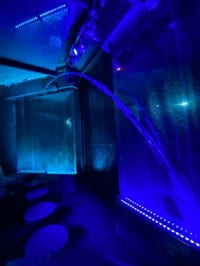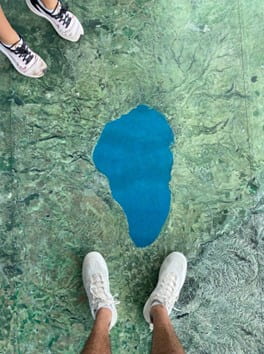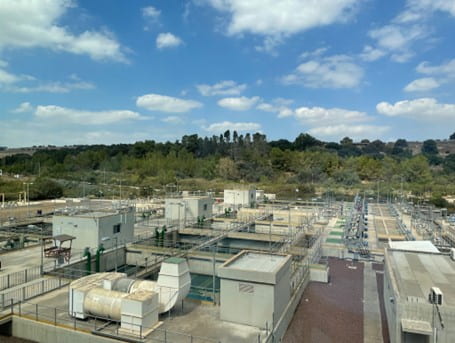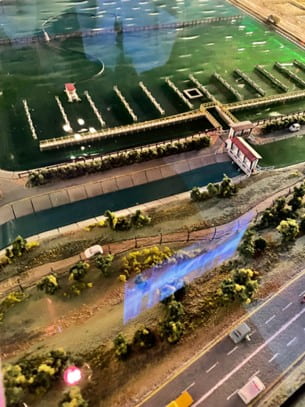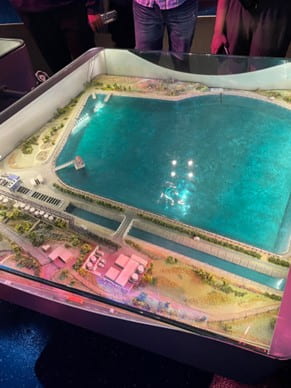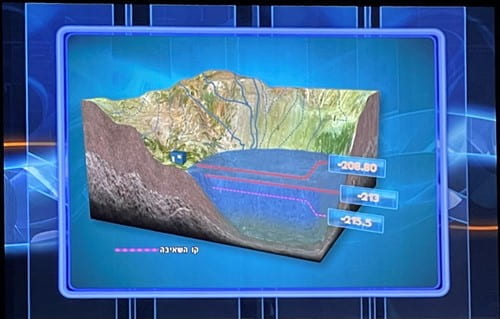National Water Carrier
By Shyam Chandra, Sara Bhaidani, Charis Lee
On September 15th, 2022, our GET Israel trip visited Mekorot, Israel’s national water carrier company that supplies Israel with 90% of its drinking water. More specifically, we visited the national water carrier’s Eshkol and Sapir sites — the pumping and filtration facilities located on the shores of the Sea of Galilee — to gain a deeper awareness of Israel’s national water infrastructure and treatment practices.
We had spent a large portion of our trip visiting specific desalination and treatment plants, so this was an especially engaging experience to tie everything together from a national perspective. Our visit began with an immersive water show that emphasized water’s significance in the history of Israel’s origin as a nation.
We learned that around 85% of Israel’s current water supply comes from desalination, 10% comes from ground and surface water like natural springs and aquifers, and around 5% comes from the Sea of Galilee itself. The amount of reliance on the Sea of Galilee as a water source has reduced dramatically because the sea has been losing around 240 million cubic meters of water per year from heat and evaporation.
This experience helped us realize the harsh reality of Israel’s water supply (if innovations in desalination hadn’t alleviated water burdens). On average, there are only 40 days of rainfall in Israel per year, almost completely condensed to the rainy season (October – April), and every six years there is a severe drought. At times, springs will completely collapse, especially ones located nearby the Sea of Galilee. When it comes to aquifers, various contaminants from industrial processes and sites, like gas stations, have seeped into the groundwater. Mekorot is responsible for monitoring these changes in the water supply and ensuring that Israel’s population has safe and reliable water at all times of the year.
During our visit, we got to see all five stages of the filtration process. It was fascinating to see how two independent filtration sectors were used to reduce the spread of problems in order to be able to run the plant 24/7.
Beginning with stage one, our tour guide illustrated the usage of Polyaluminum chloride (PAC) on flocculation/coagulation within incoming water. In this step, the aggregates sink to the bottom of a sedimentation pond forming sludge, and the remaining 99% of pre-treated water is returned to the sedimentation area. Then in the second stage, the water is moved into a standing operational reservoir where certain fishes are used to remove impurities and nuisances that bloom in the reservoir (i.e., particles, plankton, snails, algae, etc.). In stage three, the water is placed in the center filtration plant where another round of coagulation is used to remove additional bacteria, pathogens, and particles. Here, the particles are caught by an anthracite substrate, and the water is further purified through the use of a passive coil. Moving to stage four, the filtered water is advanced to a vacuumed reservoir where hypochlorite is added as a disinfectant. Lastly, in stage five the filtered water (10x better in quality than international standards) is transferred to the national carrier pipeline.
While this process is able to deliver 1.5 billion cubic meters of water a year through the 85 km long main national carrier pipeline to the Yarkon-Negev system to be distributed, there are still three parts of Israel that do not have access to this reliable water source. One of the major goals is to expand the water distribution and sewage pipelines both South to North and West to East. Highly impressed with the inner workings of this system, Mekorot did give us some food for thought on how to address their biggest challenges involving pushing back water into the sea of Galilee and dealing with the decreasing levels of the Dead Sea.
The Global Engineering Trek (GET) to Israel is jointly organized by the Northwestern Center for Water Research (NCWR) and the Israel Innovation Project (IIP). This program is focused on the topic of water (GET Water-Israel) and is offered to all first- and second-year Northwestern undergraduate students. GET Water-Israel is co-sponsored by McCormick Global Initiatives, the Institute for Sustainability and Energy at Northwestern (ISEN), the Crown Family Center for Jewish and Israel Studies, NCWR, and IIP.

